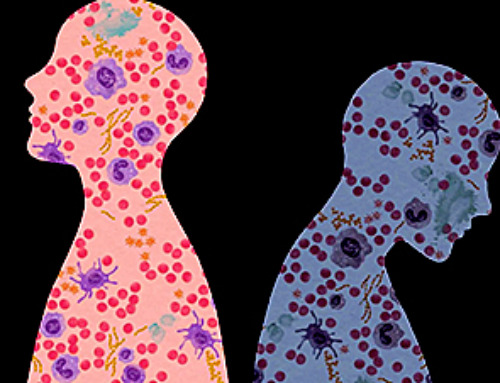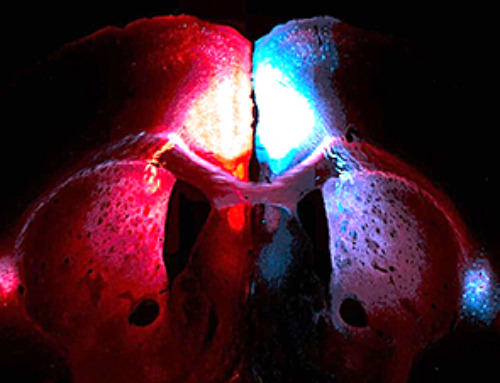One morning in March, 2020, Diana Berrent, a photographer and a mother of two from Long Island, woke up with a fever. She had chills, diarrhea, and a heaviness in her chest, and grew concerned. Her daughter was hosting a sleepover; Berrent made her way to the basement and asked the other girls to leave. Then she went into isolation for eighteen days.
Berrent had followed the news of the coronavirus from Wuhan to Lombardy and Tehran. But, she told me recently, “in suburbia, no one expects to be the first person on their block to get the plague.” She tried to get tested, but testing was limited mostly to people who’d been hospitalized. She eventually received a covid-19 diagnosis, after an acquaintance connected her to a local congressman who arranged a test. On Facebook, she conducted her own contact tracing. A few days before falling ill, she had photographed an event in a crowded elementary-school gymnasium, and she was convinced that she was Patient Zero. At the time, there were scattered reports of coronavirus cases, but few people admitted to being infected, and her social-media updates went viral. The New York Post gave Berrent a daily column in which to chronicle her illness. She started a video blog detailing her symptoms, isolation, and recovery. In one HGTV-inspired episode, she instructed viewers on “how to set up your perfect isolation room.”
Berrent started a Facebook group called Survivor Corps, as a sort of “Tinder for plasma,” she said. Within a week, the group had more than ten thousand followers. On its page, Berrent wrote that people infected by the coronavirus were “waiting to be superheroes.” Later, when monoclonal antibodies were shown to be effective at fighting covid-19, she began working with the pharmaceutical company Regeneron and the health-care firm Optum to help people arrange home delivery of the treatment.
Survivor Corps now has more than a hundred and seventy-five thousand members—it is the largest grassroots covid movement in the world. These days, Berrent meets regularly with government officials, leading scientists, patient-advocacy groups, and covid survivors and their families. Not long ago, she gave presentations to the Centers for Disease Control and Prevention, the National Institutes of Health, and a White House coronavirus task force within the same week. She appears on podcasts and panels, and sits on a number of covid committees at universities and within government, sometimes as the only patient advocate. “I’m now being asked to peer-review medical papers, and I haven’t taken biology since tenth grade,” she said.
Survivor Corps has no physical headquarters. It is, in essence, a huge Facebook group with an associated Web site. People share stories of lost parents and children; they ask for prayers and support; they vent about an unfeeling health-care system. They describe debilitating symptoms that they attribute to long covid: problems with their livers, legs, lungs, stomachs, skin, teeth, memories, and moods. They speculate about biological theories and swap medical advice, some of it valid, but some unsupported or proved ineffective. (The group, which is lightly moderated, has rules against “unsubstantiated” medical advice and conspiracy theories.) Occasionally, someone voices skepticism about what people are posting. “I am astonished at what a very close friend just said to me,” one member posted. The friend had accused her of reading “what a bunch of people write” but having “no idea if they’re telling the truth. They just tell you what you want to hear so you can blame all your issues on being sick 9 months ago.”
Advocating for such a vast constituency has pulled Berrent into choppy scientific waters. Historically, patient advocates have often found themselves opposing the researchers with whom they are trying to partner; aids activists frequently clashed with scientists, demanding faster research and more treatments, and in May, 1990, hundreds of act up members protested outside the National Institute of Allergy and Infectious Diseases, which Anthony Fauci had been leading for half a decade. More recently, advocates have worked on behalf of people who say they suffer from chronic-fatigue syndrome, fibromyalgia, chronic Lyme disease, and other conditions that some researchers consider ill-defined.
There is little doubt among researchers that long covid exists. But the syndrome is new, and lives for the moment in the realm of theory and anecdote….
News
This New Blood Test Can Detect Cancer Before Tumors Appear
A new CRISPR-powered light sensor can detect the faintest whispers of cancer in a single drop of blood. Scientists have created an advanced light-based sensor capable of identifying extremely small amounts of cancer biomarkers [...]
Blindness Breakthrough? This Snail Regrows Eyes in 30 Days
A snail that regrows its eyes may hold the genetic clues to restoring human sight. Human eyes are intricate organs that cannot regrow once damaged. Surprisingly, they share key structural features with the eyes [...]
This Is Why the Same Virus Hits People So Differently
Scientists have mapped how genetics and life experiences leave lasting epigenetic marks on immune cells. The discovery helps explain why people respond so differently to the same infections and could lead to more personalized [...]
Rejuvenating neurons restores learning and memory in mice
EPFL scientists report that briefly switching on three “reprogramming” genes in a small set of memory-trace neurons restored memory in aged mice and in mouse models of Alzheimer’s disease to level of healthy young [...]
New book from Nanoappsmedical Inc. – Global Health Care Equivalency
A new book by Frank Boehm, NanoappsMedical Inc. Founder. This groundbreaking volume explores the vision of a Global Health Care Equivalency (GHCE) system powered by artificial intelligence and quantum computing technologies, operating on secure [...]
New Molecule Blocks Deadliest Brain Cancer at Its Genetic Root
Researchers have identified a molecule that disrupts a critical gene in glioblastoma. Scientists at the UVA Comprehensive Cancer Center say they have found a small molecule that can shut down a gene tied to glioblastoma, a [...]
Scientists Finally Solve a 30-Year-Old Cancer Mystery Hidden in Rye Pollen
Nearly 30 years after rye pollen molecules were shown to slow tumor growth in animals, scientists have finally determined their exact three-dimensional structures. Nearly 30 years ago, researchers noticed something surprising in rye pollen: [...]
NanoMedical Brain/Cloud Interface – Explorations and Implications. A new book from Frank Boehm
New book from Frank Boehm, NanoappsMedical Inc Founder: This book explores the future hypothetical possibility that the cerebral cortex of the human brain might be seamlessly, safely, and securely connected with the Cloud via [...]
How lipid nanoparticles carrying vaccines release their cargo
A study from FAU has shown that lipid nanoparticles restructure their membrane significantly after being absorbed into a cell and ending up in an acidic environment. Vaccines and other medicines are often packed in [...]
New book from NanoappsMedical Inc – Molecular Manufacturing: The Future of Nanomedicine
This book explores the revolutionary potential of atomically precise manufacturing technologies to transform global healthcare, as well as practically every other sector across society. This forward-thinking volume examines how envisaged Factory@Home systems might enable the cost-effective [...]
A Virus Designed in the Lab Could Help Defeat Antibiotic Resistance
Scientists can now design bacteria-killing viruses from DNA, opening a faster path to fighting superbugs. Bacteriophages have been used as treatments for bacterial infections for more than a century. Interest in these viruses is rising [...]
Sleep Deprivation Triggers a Strange Brain Cleanup
When you don’t sleep enough, your brain may clean itself at the exact moment you need it to think. Most people recognize the sensation. After a night of inadequate sleep, staying focused becomes harder [...]
Lab-grown corticospinal neurons offer new models for ALS and spinal injuries
Researchers have developed a way to grow a highly specialized subset of brain nerve cells that are involved in motor neuron disease and damaged in spinal injuries. Their study, published today in eLife as the final [...]
Urgent warning over deadly ‘brain swelling’ virus amid fears it could spread globally
Airports across Asia have been put on high alert after India confirmed two cases of the deadly Nipah virus in the state of West Bengal over the past month. Thailand, Nepal and Vietnam are among the [...]
This Vaccine Stops Bird Flu Before It Reaches the Lungs
A new nasal spray vaccine could stop bird flu at the door — blocking infection, reducing spread, and helping head off the next pandemic. Since first appearing in the United States in 2014, H5N1 [...]
These two viruses may become the next public health threats, scientists say
Two emerging pathogens with animal origins—influenza D virus and canine coronavirus—have so far been quietly flying under the radar, but researchers warn conditions are ripe for the viruses to spread more widely among humans. [...]





















